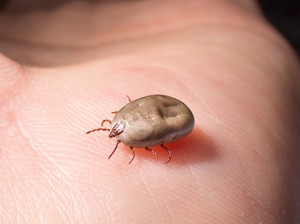AKC Canine Health Foundation Awards Three New Grants Through its Tick-Borne Disease Initiative
 RALEIGH, N.C. (June 16, 2016) – The AKC Canine Health Foundation (CHF), a nonprofit organization whose mission is to prevent, treat and cure diseases in all dogs, announces the first round of new grants awarded through its Tick-Borne Disease Initiative.
RALEIGH, N.C. (June 16, 2016) – The AKC Canine Health Foundation (CHF), a nonprofit organization whose mission is to prevent, treat and cure diseases in all dogs, announces the first round of new grants awarded through its Tick-Borne Disease Initiative.
Jason Stull, VMD, PhD, of The Ohio State University will study “Lyme Disease in Dogs: Prevalence, Clinical Illness, and Prognosis.” Lyme disease is a bacterial disease transmitted by tick bites. In people, Lyme is the most common tick-transmitted disease in the US, with over 25,000 cases in 2014. Dogs infected with Lyme disease may not show signs of illness, but underlying impact can be severe. Diagnosis, treatment and prevention of Lyme disease in dogs is complicated by limited research and conflicting professional guidance. Following a large group of dogs from different regions of the United States and Canada, the investigators will broaden the understanding of canine Lyme disease by identifying and defining best practices for prevention and control of Lyme disease in areas with different Lyme risks, ultimately improving the health of dogs and their people.
Linda Kidd, DVM, PhD, Western University of Health Sciences, and her team will study “Thrombocytopenia and Occult Vector-Borne Disease in Greyhound Dogs: Implications for Clinical Cases and Blood Donors.” Retired racing Greyhounds are common blood donors for dogs requiring blood transfusions. Low platelet (thrombocytopenia) and white blood cell counts are considered normal findings in Greyhounds, as is protein in their urine. Because vector-borne disease pathogens can cause chronic, clinically silent infection, the researchers hypothesize that infection occurs in, and contributes to blood and urine abnormalities in some healthy-appearing retired racing Greyhounds. This study will compare the prevalence of vector-borne diseases in retired racing Greyhounds and show-bred Greyhounds, and will investigate whether blood and urine abnormalities occur with the same frequency in these two lines of Greyhounds. The results will help veterinarians decide when to pursue infectious disease testing, while also informing best practices for screening canine blood donors.
Mary Anna Thrall, DVM, MS of Ross University School of Veterinary Medicine and her team will investigate “The Role of Lymphocytes in Canine Monocytic Ehrlichiosis (CME),” an important tick-borne disease in dogs caused by the pathogen, Ehrlichia canis. In an effort to understand the variable severity of the disease amongst dogs, the team will study the role and types of lymphocytes present in Ehrlichia-positive dogs to determine if increased lymphocyte counts and a large number of genetically identical lymphocytes are associated with disease severity. The findings from this study will help advance the understanding of the pathophysiology and accurate diagnosis of canine ehrlichiosis and lymphocytosis.
“This first round of funding through the AKC Canine Health Foundation’s Tick-Borne Disease Initiative shows promising research to address important tick-borne diseases affecting dogs,” said Dr. Diane Brown, CHF chief executive officer. “We are excited about the impact this Initiative will have on canine health and owner awareness of the growing concern over important tick-borne pathogens.”
Funding for CHF grants comes from a number of sources, including: corporations, dog clubs, and individuals who are committed to the betterment of canine health through scientific research. During 2016, all donations to the Tick-Borne Disease Initiative are being matched dollar-for-dollar by the American Kennel Club (up to $250,000). Make an impact and double your donation today:www.akcchf.org/ticks.
Short URL: http://caninechronicle.com/?p=106327
Comments are closed











